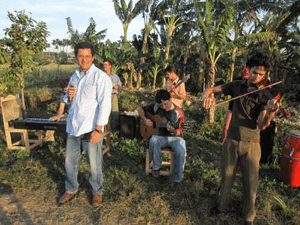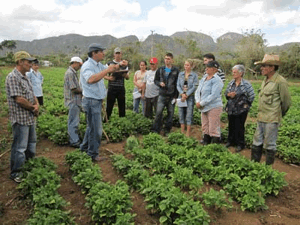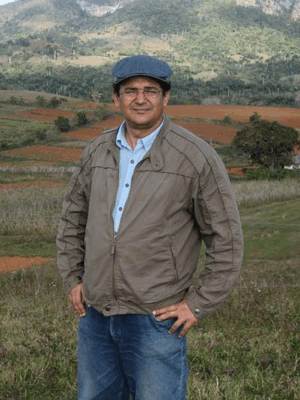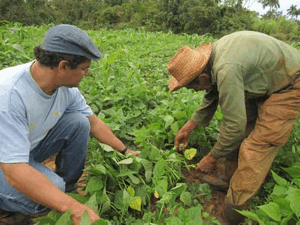Agriculture in Rhythm
Air Date: Week of April 30, 2010
 |
You can't take the culture out of agriculture. That's the view of Cuban musician and scientist Humberto Rios. He's won this year's Goldman Prize for his contribution to sustainable farming on the island and he speaks with host Jeff Young.
Transcript
YOUNG: The richly diverse culture of Cuba comes through in its music. And the island’s rich and diverse plant life comes through in its food. Agricultural scientist and musician Humberto Rios is tapping into both. His work to support organic farming and crop diversity recently won the prestigious Goldman prize—sometimes called the Green Nobel.
Like all Cubans, Rios was profoundly challenged by the collapse of the Soviet Union. All Cuban agriculture was based on the Soviet system of monoculture crops and pesticides. With the Soviets gone, Rios needed new ways to farm.
RIOS: So I realized that we had to refocus all the plant breeding system in my country.
YOUNG: Rios turned to Cuba’s farmers. He found far more varieties of plants in their small plots than researchers were aware of. Rios realized that Cuba’s plant diversity could be its strength.
RIOS: So I start to work with farming at that time. And I realized that they had a lot of knowledge to teach me.
YOUNG: I guess it’s like having a broader toolbox when you have more variety of seeds, then you have more options for what—different soil types you can cultivate, different weather you can adjust to, that sort of thing?

Humberto Ríos works with a community of farmers (Credit Will Parrinello)
RIOS: Yeah, yeah, it’s true. You should respect the environment instead of to transform the environment to grow the seeds.
YOUNG: Uh huh.
RIOS: It’s the way. It’s the only way around to save our culture. But most of the time the conventional scientists have been transforming the environment. To homogenize the environment at the same time to grow the same variety all over the places. So this method is promoted to look for the real diversity that can grow in a specific environment.
YOUNG: You know, we have a saying in English, I don’t know if there’s a Spanish equivalent, but it goes: if the only tool you have is a hammer, everything looks like a nail. But what you’re saying is if you have different seeds, you don’t have to be as forceful on the environment, on the land?
RIOS: Of course, you have a lot of tools, not only a hammer.
YOUNG: So what happened when you took what you were learning from farmers back to the university in Havana? Was there resistance there?
RIOS: You know, the scientists are a little bit, how can I say? Conservative. So, they classify me like big crazy guy. So, I had to overcome that, but I see the evidence was the main tool to overcome these obstacles.
YOUNG: Hmm. So what was it that persuaded those who were skeptical, was it because your method proved to be more productive?

Humberto Ríos. (Credit: Will Parrinello)
RIOS: Yeah, it’s more productive, it’s in favor of diversity, and it’s more culturally appropriated. So, culture is for me a big issue.
YOUNG: When Rios says “culture” he’s speaking as a musician. He’s sows agricultural themes into his music. Music is at the heart of Cuban identity and Rios says it’s been an effective way to help him communicate.
RIOS: For example, I have popular song in Cuba; it’s called “Mango Chupe”. It’s a type of mango. This song is promoting the diversity of mango that we have in Cuba, but mango at the same time means pretty, pretty lady, or pretty guy, you know? So it’s a double meaning the people enjoy too much…
[YOUNG LAUGHS]
RIOS: You provide the subliminal message all the time. Even the policymakers dance and laugh a lot!
[MUSIC]
YOUNG: For Rios culture and agriculture are flipsides of the same coin. And diversity in one feeds the other.
RIOS: So diversity crops have to do with diversity of opinions, of diversity of selection criteria. So through thousand and thousands of years, people in the world have been able to chose the seed that they want to grow according to their culture. So you cannot separate agri with culture.

Humberto Ríos playing with his band. (Credit: Will Parrinello)
YOUNG: That’s an interesting point. I mean you can’t spell agriculture without culture.
RIOS: Sure, that is why it is very important to sing. Because it’s the accompanying of the culture to agri. I’ve farming all the time I’ve been singing! So it’s the same package that you cannot split. So that is why all the people, the farmers love this kind of job that we are doing together. It’s a real cultural exchange.
YOUNG: Rios says he hopes this kind of agriculture will continue to flourish on the island. Even as politics and economy change. He hopes the United States, just 90 miles away, will one day be an export market for organic, Cuban produce. In the meantime, there is song to spread the word.

Humberto Ríos works with a farmer in a Cuban field (Credit: Will Parrinello)
RIOS: To bring some laugh, to bring someone a smile to the farm. In the way that the people can be more optimistic and more independent.
YOUNG: Humberto Rios, thank you very much, it was a great pleasure talking with you.
RIOS: Okay, thank you.
Links
To learn more about the Goldman Prize and to read Humberto Rios' bio, click here.
Living on Earth wants to hear from you!
Living on Earth
62 Calef Highway, Suite 212
Lee, NH 03861
Telephone: 617-287-4121
E-mail: comments@loe.org
Newsletter [Click here]
Donate to Living on Earth!
Living on Earth is an independent media program and relies entirely on contributions from listeners and institutions supporting public service. Please donate now to preserve an independent environmental voice.
NewsletterLiving on Earth offers a weekly delivery of the show's rundown to your mailbox. Sign up for our newsletter today!
 Sailors For The Sea: Be the change you want to sea.
Sailors For The Sea: Be the change you want to sea.
 The Grantham Foundation for the Protection of the Environment: Committed to protecting and improving the health of the global environment.
The Grantham Foundation for the Protection of the Environment: Committed to protecting and improving the health of the global environment.
 Contribute to Living on Earth and receive, as our gift to you, an archival print of one of Mark Seth Lender's extraordinary wildlife photographs. Follow the link to see Mark's current collection of photographs.
Contribute to Living on Earth and receive, as our gift to you, an archival print of one of Mark Seth Lender's extraordinary wildlife photographs. Follow the link to see Mark's current collection of photographs.
 Buy a signed copy of Mark Seth Lender's book Smeagull the Seagull & support Living on Earth
Buy a signed copy of Mark Seth Lender's book Smeagull the Seagull & support Living on Earth

